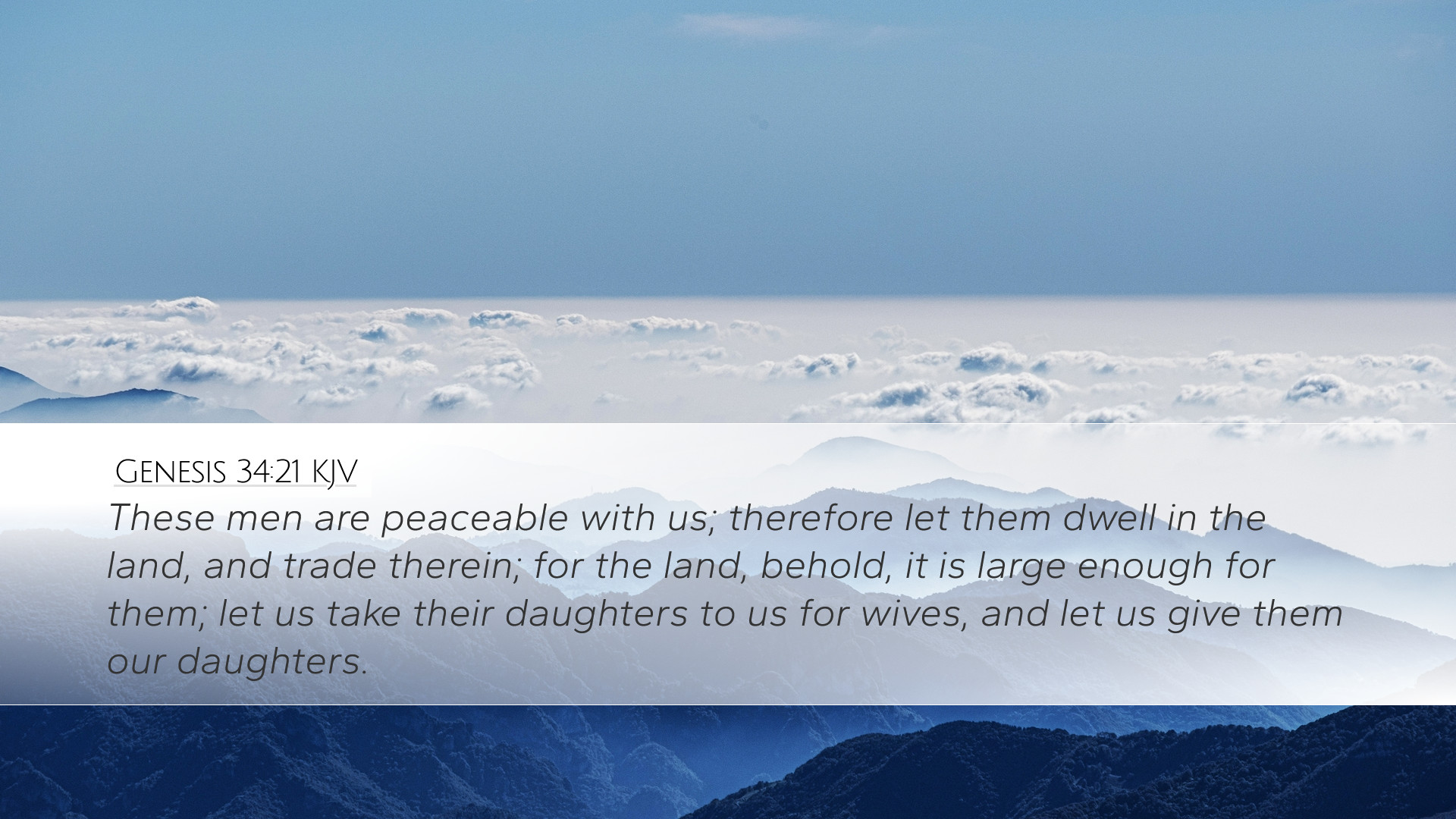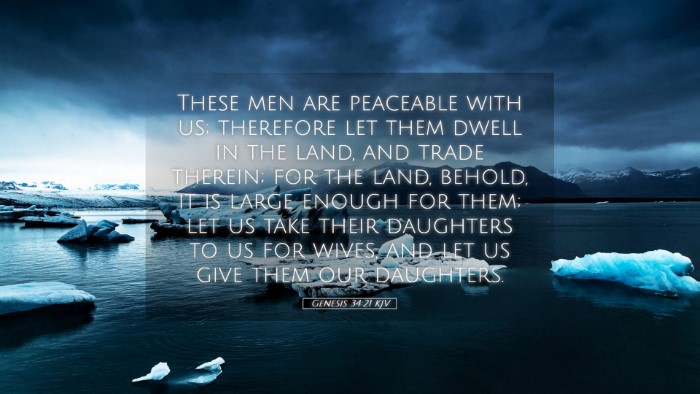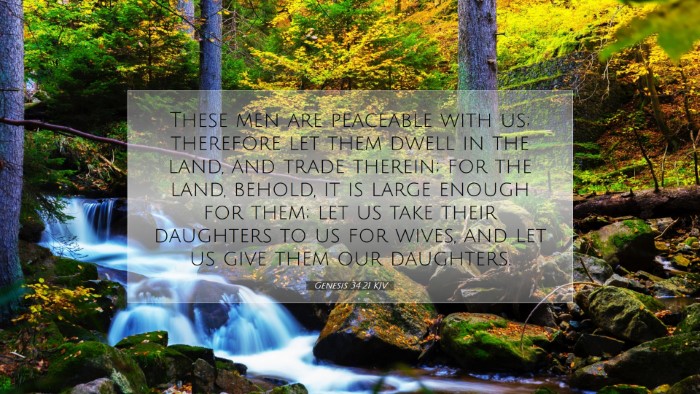Commentary on Genesis 34:21
Verse: "These men are peaceable with us; therefore let them dwell in the land, and trade therein; for the land, behold, it is large enough for them."
Introduction
The narrative of Genesis 34 presents a complex interplay of social, ethical, and theological themes surrounding the events in Shechem, particularly focusing on the consequences of Dinah's violation and its aftermath. Verse 21 embodies a pivotal moment wherein the leaders of Shechem engage with Jacob's sons, suggesting a deceptive peace amid underlying tension. This commentary seeks to explore the implications of this verse through insights drawn from multiple public domain commentaries.
The Context of Genesis 34
Genesis 34 recounts the story of Dinah, the daughter of Jacob, who is violated by Shechem, the son of Hamor the Hivite. Following this, the brothers of Dinah maneuver through a series of events that culminate in a violent response. The verse in focus encapsulates the dialogue between Hamor and Jacob’s sons, where Hamor seeks to establish a friendly relationship and community integration, demonstrating the fragility and complexity of these interactions.
Interpretations from Notable Commentaries
Matthew Henry's Commentary
Matthew Henry emphasizes the duplicitous nature of Hamor’s proposal. While he claims peace and trade, there is an underlying motive to legitimize his son's actions in violation of Dinah. Henry notes that the invitation to dwell in the land signifies a desire to integrate the Israelites, but it is tinged with manipulation. The peace that Hamor speaks of is superficial, reflecting a common theme in biblical narratives where appearances can deceive.
Albert Barnes' Notes on the Bible
Albert Barnes provides insight into the socio-economic considerations inherent in the dialogue. He remarks that the land was indeed "large enough" for both groups, which might signify not only physical space but also a potential for prosperity through mutual trade. However, Barnes warns that this proposal comes in a context where trust has been severely compromised. The allure of commerce and settlement is shadowed by past injustices, illustrating that economic opportunities are not to be pursued at the expense of moral convictions.
Adam Clarke's Commentary
Adam Clarke focuses on the diplomatic outcome that Hamor seeks to instigate. He argues that Hamor's assertion of peace is intended to mask the underlying tensions stemming from the crime against Dinah. Clarke indicates that such a call for peace often masks unresolved conflicts, suggesting that the apparent peace may not withstand the pressures of family honor mentioned later in the narrative. He also highlights the irony that while Hamor seeks to trade, it is ultimately the brothers’ desire for revenge that shapes the direction of events.
Socio-Ethical Implications
The intersection of peace and justice is a recurrent theme in biblical texts. Here, the desire to coexist peacefully with the men of Shechem raises profound ethical questions about reconciliation and the price of peace. Pastors and theologians may find this verse illustrates the tension between secular diplomacy and divine justice, where the pursuit of peace must be balanced with righteousness and truth.
Moral Lessons from the Text
- Peace vs. Righteousness: The call for peace must not overshadow the need for justice. Jacob's sons, while presented with an opportunity for integration, prioritize their sister's honor, illustrating that true peace cannot coexist with injustice.
- The Complexity of Human Relationships: The interactions between Jacob's family and the men of Shechem exemplify the intricacies of human relationships where trust, betrayal, and negotiation intersect.
- The Danger of Deception: The facade of peace is a reminder of how easily intentions can be manipulated, cautioning leaders to discern underlying motives in all interactions.
- Cultural Exchange and Identity: The aspiration for trade reveals the potential for cultural exchange but raises questions concerning identity and integrity in the face of external pressures.
Theological Reflections
From a theological perspective, Genesis 34:21 serves as a reminder that the narratives of the Old Testament are not merely historical accounts but profound lessons on human behavior in light of divine expectations. Each character response sheds light on the nature of sin, redemption, and the necessity of faithfulness to God’s commandments even amidst cultural and social complexities. The current application for scholars and students lies in wrestling with the tension between the call to love one’s neighbor and the imperative to uphold justice.
Conclusion
Genesis 34:21 resonates with contemporary readers as it encapsulates age-old human disputes over honor, community, and moral integrity. The insights from Matthew Henry, Albert Barnes, and Adam Clarke provide a rich tapestry of understanding, revealing the dangers of superficial peace and the integrity required to navigate complex relational landscapes. For pastors, students, and theologians, this verse challenges the faithful to seek true peace founded on justice, reflecting the heart of God amidst human brokenness.


